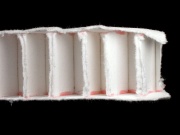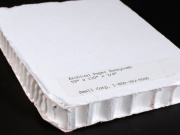Difference between revisions of "Honeycomb board"
m (Text replace - "== Authority ==" to "== Sources Checked for Data in Record ==") |
|||
| Line 14: | Line 14: | ||
° M.Mecklenburg, J. Webster "Aluminum honeycomb supports: their fabrication and use in painting conservation" ''Studies in Conservation'' 22: 177-189, 1977 | ° M.Mecklenburg, J. Webster "Aluminum honeycomb supports: their fabrication and use in painting conservation" ''Studies in Conservation'' 22: 177-189, 1977 | ||
| − | == | + | == Sources Checked for Data in Record == |
* Theodore J. Reinhart, 'Glossary of Terms', ''Engineered Plastics'', ASM International, 1988 | * Theodore J. Reinhart, 'Glossary of Terms', ''Engineered Plastics'', ASM International, 1988 | ||
Revision as of 06:19, 1 May 2016
Description
Lightweight, strong honeycomb boards are made from Aluminum and/or nonmetallic fabrics, such as Nomex® aramid fiber sheets. The Nomex® sheets are bonded at key points with a thermosetting Adhesive then expanded to form hexagonal cells. The expanded honeycomb is cured into placed is with Phenolic resin. They are lightweight and resistant to fire, water, and biological growth. It is also a good thermal and electrical insulator. The foam core may then be sandwiched with one or more sheets of Paper, Metal, Wood, and/or Plastic. Honeycomb panels with aluminum cores provide a rigid, lightweight and chemically inert support material.
Synonyms and Related Terms
honeycomb panel; honeycomb paper; HRH-10 [Hexcel]; Aeroweb [Ciba-Geigy]; AHN [Advanced Honeycomb Technologies]; Honeycomb HMX-20 [Ciba-Geigy]; Hexcel ACG [Hexcel]
Additional Information
° M.Mecklenburg, J. Webster "Aluminum honeycomb supports: their fabrication and use in painting conservation" Studies in Conservation 22: 177-189, 1977
Sources Checked for Data in Record
- Theodore J. Reinhart, 'Glossary of Terms', Engineered Plastics, ASM International, 1988
- Pam Hatchfield, Pollutants in the Museum Environment, Archetype Press, London, 2002

